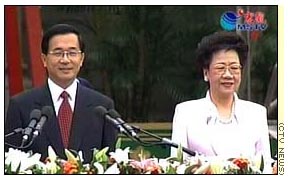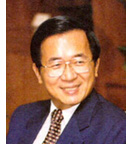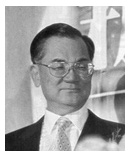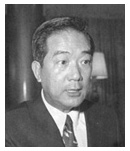Year 2004 Referendum and Presidential Elections

Presidential elections are
coming up again in Taiwan on 20 March 2004. This will be only the
third time in history that such elections are held on the island:
Until the mid-1980s, Taiwan suffered under the harsh one-party rule
of the Kuomintang. In 1992, the people on the island voted for the
first time for a fully democratically-elected parliament, the
Legislative Yuan.
The first presidential
elections were held only in 1996. In the second presidential
elections, in March 2000, President Chen Shui-bian was elected as
the first president from the Taiwanese democratic opposition of the
DPP -- in spite of strong threats and intimidation by China.
Now he is up for
reelection, and is running with vice-President Annette Lu against a
combined ticket of the KMT's Lien Chan and the PFP's James Soong. In
2000, these two ran separately -- a split which helped make it
possible for Chen Shui-bian to get elected.
The present election
campaign is enlivened by a heated international debate about
Taiwan's brand-new referendum law, passed by the Legislative Yuan on
27 November 2003, and signed into law by the President on 31
December. Article 17 of this law makes it possible for the president
to call for a "defensive referendum", and Mr. Chen has
indicated he intends to do so: on 20 March 2004 he will ask the
people in Taiwan if they agree that China should dismantle its
missiles aimed at Taiwan and that it publicly renounce the use of
force against Taiwan.
Below, we take a closer look
at each candidate.
Real-time election results on 20 March 2004
Chen Shui-bian: referendum and a promise of a new constitution

During the past few months, President Chen has been slowly but
surely gaining in the opinion polls in Taiwan. Up until the summer
of 2003, he was generally viewed as trailing considerably behind his
"pan-blue" rivals, the combined ticket of the KMT's Lien
Chan and the PFP's James Soong.
However since September and October 2003 a number of things
happened: two huge "name change" rallies took place in
Taiwan -- both led by former President Lee Teng-hui -- making the
case for discarding the outdated "Republic of China"
title, and for adoption of "Taiwan" as the formal name for
the country. The scale of the rallies was unprecedented — some
150,000 people on September 6th 2003 in Taipei, and some 200,000 on
October 25th in Kaohsiung -- and gave impetus to the idea that the
people on the island were ready for such change.
It seems that the two events made the people on the island realize
that the upcoming election is crucial for the island's future:
increasingly they coalesced around the President, and moved away
from the pan-blue Lien-Soong coalition, in spite of the strong hold
the pan-blues still have over both the electronic and printed media.
Mr. Chen also became increasingly self-assured, speaking out about
the need to complete the democratization process, and set up a
mechanism to give the people on the island a voice in deciding
important issues. The debate about a referendum law had been going
on for some time: the DPP -- and particularly legislator Chai
Trong-rong -- had been advocating such a law for almost a decade,
but it wasn't until the Spring of 2003 that the Legislative Yuan
started to discuss the passage of such a law in earnest.
For a long time the debate in the Legislative Yuan was bogged
down, due to the fact that the pan-blue coalition still had a
majority. However, by mid-November 2003, the movement towards more
openness and democracy became unstoppable, and the pan-blue
coalition decided that a referendum law was unavoidable. Mr. Chen
profited from this momentum, and by the beginning of December 2003,
most opinion polls on the island showed him in an even race with his
opponents. By the end of December 2003, most polls showed him
drawing ahead, by the latest polls some 36% for the Chen-Annette Lu
ticket, versus some 34% for Lien-Soong.
Mr. Chen has also spoken out in favor of a
New
Constitution, to replace the present anachronistic "Republic
of China" Constitution, adopted by Chiang Kai-shek's
Nationalists in Nanking in China in December 1946.
Lien Chan, Kuomintang Presidential candidate
Lien Chan: making Al Gore look exciting

Mr. Lien Chan was selected as the Kuomintang's presidential
candidate in a KMT Party Congress in April 2003. He chose People's
First Party leader James Soong as his running mate.
The problem with Mr. Lien Chan is that he is a dour politician.
The standard joke in Taiwan is that Mr. Lien "makes
US Presidential candidate Al Gore look exciting."
Another problem with Mr. Lien is that he is exceedingly wealthy.
For many in Taiwan this raises the question how his wealth was
obtained. While there are no direct indications that Mr. Lien's
wealth was achieved in other than legitimate business practices,
there is a long history of links between the KMT's wealth -- "gold"
in Taiwan's terminology -- and the not insignificant underworld of
gangs and triads -- "black" in Taiwan's political
spectrum.
The DPP has long criticized the linkage between "black"
and "gold." A number of well-known figures in the
underworld were able to "buy themselves clean" by running
for office and even being elected to positions such as the
Legislative Yuan and County Magistrate. The Kuomintang has
traditionally condoned such activities and has done very little to
stem the influence of the underworld and money in politics.
James Soong, People's First Party, vice-presidential candidate
James Soong's financial scandals

In the 2000 Presidential elections, Mr. Soong initially was the
front runner, scoring significantly ahead of his two rivals in the
opinion polls. He eventually ended up in second place, trailing
behind the victorious President Chen.
Mr. Soong 's downfall was a corruption scandal, which continued to
follow him during the past four years. Both the Chung Hsing Bills
Finance embezzlement scandal and the Lafayette scandal reportedly
involved hundreds of millions of US dollars, which disappeared.
Soong is the major suspect, but because of his political position he
has been able to avoid punishment (see James Soong:
follow
the money, in Taiwan Communiqué issue
no. 105, p. 10-11).
However, in spite of all this, Mr. Lien Chan selected Mr. Soong as
his vice-presidential running mate.
|

